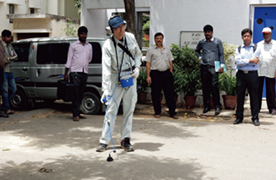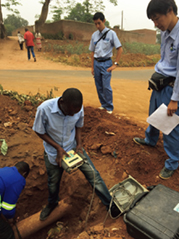(2) Safe Water and Sanitation
Water and sanitation are vital issues linked to human life. In 2017, approximately 844 million people worldwide had no access to safe water, such as piped water and wells, while approximately 2.3 billion people - about half of the population of developing countries - had no access to improved sanitation facilities, such as toilets and sewage systems. Diarrhea due to lack of safe water and sanitation facilities accounts for the deaths of approximately 360,000 children under the age of five.(Note 14) Moreover, being unable to access safe water hobbles the economy. For example, in developing countries where piped water is not widely available, in many cases women and children bear the role of fetching water. Sometimes they spend many hours going to draw the water, so opportunities for education of children and empowerment of women are being lost. Furthermore, unstable supply of water has negative impact on healthcare and agriculture as well.
From this viewpoint, the SDGs set forth the target of “Ensure availability and sustainable management of water and sanitation for all” under Goal 6.
•India
Verification Survey with the Private Sector for Disseminating Japanese Technologies for the Water Leak Detection Service Using a Leakage Monitoring Technology in Bangalore
Support for Japanese SMEs Overseas Business Development (Verification Survey) (February 2015 - February 2017)
India's cities are experiencing rapid economic growth and urbanization. Particularly cities with high population density cannot supply enough water to meet demand because of insufficient technology in the construction of water pipes as well as problems such as water leakage. Nevertheless, no surveys are conducted on underground water leakages. The repair of water leakage is done only when the leakage has been observed by visual inspection on the surface. As such, it is required to reduce the water leakage rate and mitigate the gap of water supply and demand.

Technical training on water leakage detection using a leakage detector: the sound of water dripping is detected with a flashing LED light.
Suidou Technical Service Co., Ltd. (Yokohama City, Kanagawa Pref.) with its wealth of experience in water leakage detection technology, participated in “Support for Japanese SMEs Overseas Business Development” and began by initiating a verification survey with its automatic leakage monitoring device “L-sign” in the City of Bangalore in Karnataka, the third most populous in India. The company specializes in proprietary sound detection technology and works to reduce water leakages using various leakage detectors. Suidou Technical Service installed 20 of “L-sign” monitors on the water service pipes and 3,000 monitors on water supply pipes along approximately 50 km of water supply pipes and 3,000 households under the Office of Bangalore East Urban District. As a result, leakages were found at 29 locations and repaired.
The work performed by Suidou Technical Service also made it possible to detect potential underground leakages and prevent loss of water.
The Bangalore Water Supply and Sewerage Board (BWSSB), which jointly verified the effectiveness of L-sign together with Suidou Technical Service, shared very positive feedback, saying “They understood our needs and carefully adapted their work to the environment.” The BWSSB also established a new department to address non-revenue water from the viewpoint of the importance of preventing water leakages. Following this, Suidou Technical Service was newly contracted to conduct water leakage detection training for local engineers (such as picking out water leakage detection sound), providing not only hardware but also actively imparting technical skills.
<Japan's Efforts>
Japan's assistance in the fields of water and sanitation has been the largest in the world since the 1990s. Japan provides support in both the “software” (non-physical) and “hardware” (physical) aspects by drawing on Japan's extensive experience, knowledge, and technology in these fields, including: (i) promotion of integrated water resources management; (ii) provision of safe drinking water and basic sanitation (improvement of sanitation facilities); (iii) support to enable stable water use for increasing food production and other purposes (e.g., water for agricultural use); (iv) water pollution prevention (establishing effluent regulations, etc.) and ecosystem conservation (conservation of vegetation and sustainable forest management); and (v) mitigation of damage from water-related disasters (establishment of an early warning system and strengthening the disaster response capacities of communities).
Through its development cooperation, Japan supports wider expansion of safe water in developing countries through technical cooperation such as the dispatch of experts and acceptance of trainees from developing countries, ODA loans and grant aid. In addition, Japan also provides support through international organizations.
For example, in the Asia and Oceania regions, Japan is currently implementing projects for the development and expansion of piped water in Myanmar, Cambodia, Viet Nam, and Palau. In Cambodia, where improvement of the water supply ratio in rural areas is needed, Japan signed the Exchange of Notes of Grant Aid in March 2017 for the “Project for Expansion of Water Supply System in Kampot” through grant aid. In India, where the population is increasing and economic development is progressing, new ODA loans for the “Andhra Pradesh Irrigation and Livelihood Improvement Project (Phase 2) (I)” and “Rajasthan Water Sector Livelihood Improvement Project (I)” were signed in March 2017. In Bangladesh, an ODA loan for “Small Scale Water Resources Development Project (Phase 2),” to be used to develop small-scale water resource management facilities and farm roads in farming villages, as well as to provide training and technical guidance to water management unions, was signed in June 2017.
In Honduras, which is in the Latin America and Caribbean region, Japan signed the Exchange of Notes on the grant aid project called the “Project for Improvement and Extension of Water Supply System in Comayagua City” in June 2017. This project aims to improve water quality and sanitation through the improvement and extension of water supply facilities, including water purification facilities.
In Africa, Japan is currently implementing projects aimed at improving access to safe water and the water supply ratio in Ethiopia, Sudan, and other countries. With Uganda, the Exchange of Notes on new grant aid for the “Project for Rural Water Supply in Lake Kyoga Basin, Eastern Uganda” was signed in May 2017.
In addition, Japan supports the water and hygiene environment improvement projects by Japanese NGOs through the Grant Aid for Japanese NGO Projects. For example, Asian People's Exchange (APEX) is engaged in a wide-area dissemination and promotion project in Indonesia for community wastewater treatment systems that can produce quality treated water while enabling easy operations and management at low costs, over a three-year period from February 2017. In FY2017, 12 such systems are being installed on the island of Java, and the system has become one that is highly recommended by Indonesia's Ministry of Public Works and Housing.
In parallel with these efforts, cooperation using Grant Assistance for Grass-Roots Human Security Projects, etc. and efforts for the improvement of the water environment in developing countries in cooperation with domestic and local private sector organizations are also being carried out in regions around the world.
The Ministry of the Environment is also carrying out initiatives. For example, there are serious water contamination problems in many Asian countries. In order to eliminate the lack of relevant information and knowledge, the Ministry started the Water Environment Partnership in Asia (WEPA). With the cooperation of the 13 participating countries(Note 15) in Asia, WEPA is aiming to enhance water environment governance in Asia through the building of human networks, the gathering and sharing of information, and capacity building, etc.
•Malawi
Yokohama Waterworks Bureau Partner Volunteer Dispatch
Dispatch of YWWB staff to Malawi (JICA Volunteer Program) (2014 - 2016, and 3 years from 2017)
Following the Fourth Tokyo International Conference on African Development (TICAD IV) held in Yokohama in 2008, JICA has collaborated with the City of Yokohama and Yokohama Waterworks Bureau (YWWB) to provide assistance in Africa. In September 2014, the YWWB dispatched three staff members to Blantyre Water Board (BWB) in Malawi as short-term volunteers to provide assistance aimed at improving water services. For this project, BWB requested a continuous dispatch of volunteers, and in response, YWWB has sent three volunteers to BWB each year for three consecutive years up to FY2016, with a total of nine short-term volunteers dispatched. Using their experience, the volunteers joined BWB staff on the front line in providing technical assistance for detecting water leaks and devising solutions to address unpaid bills. One of the volunteers, who arrived in Malawi with a strong desire to contribute to the advancement of developing countries using Japanese experiences, was impressed by the local people's eagerness to learn.

BWB staff receiving technical training
BWB faces the challenge of non-revenue water (NRW). NRW is the problem of the failure to collect fees due to water leaks or the theft of water by illegal connections to the supply pipes. The rate of NRW in Malawi is 40% (8.2% in the City of Yokohama), which requires an immediate improvement. Given this situation, in April 2017, JICA together with YWWB concluded the “Memorandum of Cooperation on Volunteer to Assist Blantyre Water Board in Malawi,” which entails the dispatch of four short-term volunteers every year from YWWB for three years starting in FY2017. The dispatch will target selected model areas to comprehensively address NRW and improve customer service including fee collection.
This project is expected to achieve the following: (i) establish checkpoints on the design and construction of water pipes (installation) and contribute to the skills reinforcement of BWB employees; (ii) compile workshop (training) manuals aimed at enhancing awareness and technology of meter readers to enable BWB employees to conduct workshops on their own; and (iii) make BWB employees acquire appropriate data collection skills in order to investigate the cause of NRW and propose solutions. (As of December 2017)
- Note 14: Source: WHO/UNICEF “Progress on Drinking Water, Sanitation and Hygiene: 2017 Update and Sustainable Development Goal Baselines”
- Note 15: Japan, Cambodia, Thailand, Laos, Malaysia, China, Indonesia, the Republic of Korea, the Philippines, Viet Nam, Myanmar, Sri Lanka, and Nepal
